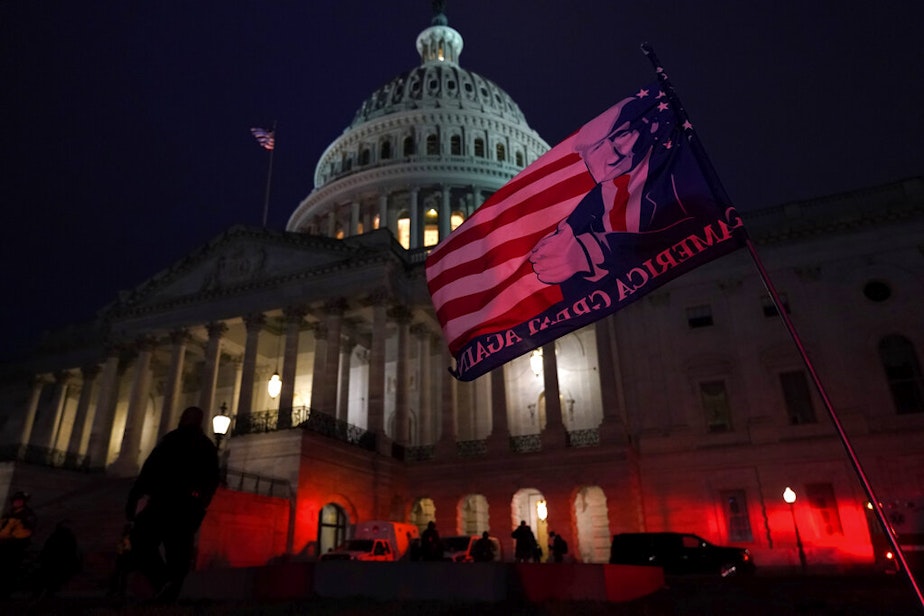New UW study investigates how lies about the 2020 election were pushed by online super spreaders

A new report from the University of Washington's Center for an Informed Public looks at how the "big lie" about a stolen election led to the January 6 insurrection at the U.S. Capitol.
Kate Starbird is one of the report's co-authors, and she talked about the findings with KUOW's Kim Malcolm.
The report states the primary "repeat spreaders" of false and misleading narratives were verified blue check accounts belonging to partisan media outlets, social media influencers, and political figures, including President Trump and his family. If these influential accounts had been suspended earlier, what kind of difference do you think that could have made?
Kate Starbird: I think it would be very difficult to suspend the account of a presidential candidate as an election is going on. And so I understand why the platform–during the election season—may not have chosen to do that. But, we can see that President Trump's account became a major amplifier. He was the most retweeted account for content that was spreading false and misleading information about the election and election procedures. And so certainly taking him out of the system would have reduced the spread of that false information. But I think it would’ve been very difficult politically, to take that kind of action.
When you looked at the results of this report, was there anything that really jumped out at you?
Starbird: When we were doing the work on repeat spreaders, we knew the trends were there, but we didn't know just how big they were. There was one website, the Gateway Pundit, which was cited in 45 different incidents of false and misleading information between September and December 2020.
When we think about the "big lie" initially, it was mail-in ballots. Then it was voting machines. Then dead voters, and then it was all these different things. It reminds me of an old-school Russian disinformation campaign where they just throw voter fraud spaghetti at the wall. There are lots of narratives on the wall and they see which ones stick. The end result is people are left with this feeling that something bad must have happened. But when you unwind each of these narratives none of them makes sense and they're not even coherent. But people still feel like something bad must have happened. “We saw all of this smoke, there must have been fire,” but in reality when we open everything up, there's just a bunch of smoke machines.
Sponsored
Many people believe that the spread of election mis/disinformation is going to continue unless social media companies crack down hard on the super spreaders. What do you think is the most important change that the companies can make now?
Starbird: We're starting to see platforms making some changes and starting to apply a repeat offender policy. Twitter just put one in place around Covid-19 misinformation that says “if someone is repeatedly spreading false information,” they begin to take increasingly harsh action. So initially, they might give a warning, and then they'll give a short-term suspension to an account. But if they keep doing it, they'll earn a permanent suspension. I think those kinds of policies that focus on not just everyday tweeters, but the people that are really making an impact. It shrinks the problem, you don't have to monitor everything. They focus on these highly influential super spreaders and begin to take actions that hold them accountable for spreading false and misinformation that's harmful to society.
There's another election cycle two years down the road. How much better is it going to be two years from now?
Starbird: Because the stage is already set with a large percentage of people in the United States firmly believing that they were cheated in this past election and that their candidates were cheated; I think that sets up this continued vulnerability to similar narratives in the future.
Even though social media platforms may be taking different kinds of actions, there are still a lot of people and media entities that are incentivized to spread this kind of false and misleading information, thinking that it's going to give them short-term gain, but in the long-term, it erodes our democracy. Because people begin to lose faith in the process.
Sponsored
I'm not super confident that 2022 or 2024 are going to be any better and I'm actually quite worried. But also hopeful that there are a lot of folks that care about this that are trying to make a difference. I'm hoping that we can help turn this tide and bring people back closer to a shared reality, and start rebuilding trust in our processes and in each other.
Kate Starbird is a principal investigator with the University of Washington Center for an Informed Public and a co-author of the Election Integrity Partnership's report on the 2020 election titled The Long Fuse: Misinformation and the 2020 Election.
Listen to the interview by clicking the play button above.
This interview has been edited for clarity.





